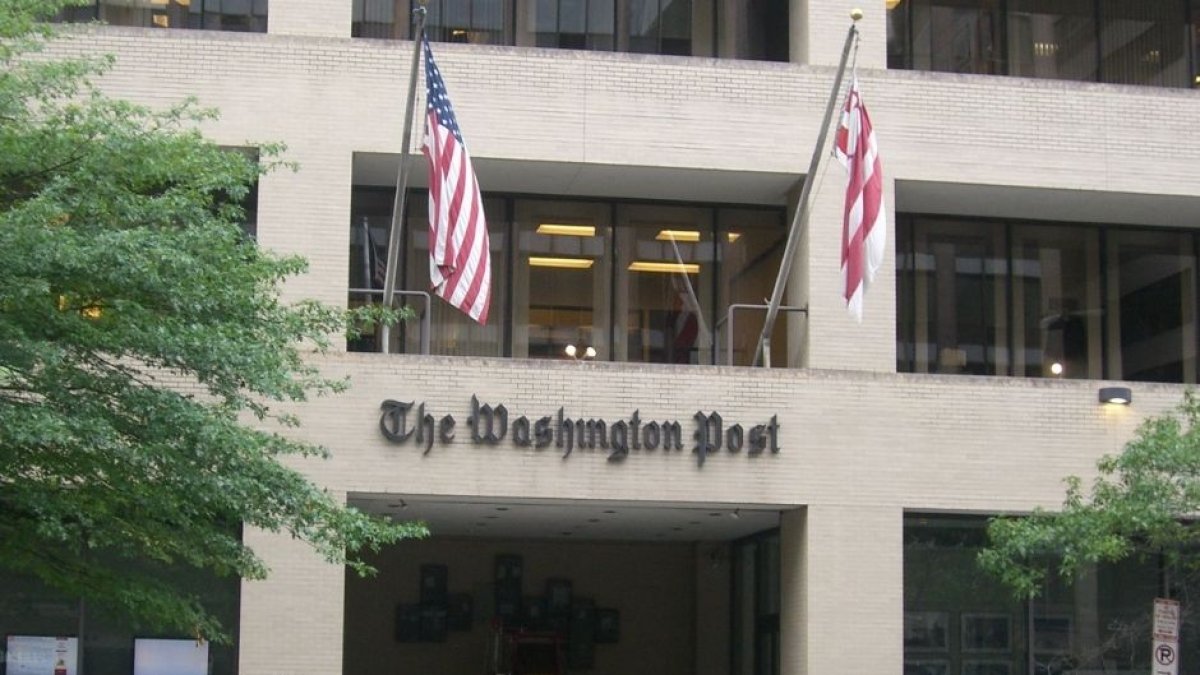The Washington Post under fire for having pro-Hamas bias and employing former Al Jazeera reporters
An investigation by The Washington Free Beacon revealed that six members of the newspaper's foreign affairs office worked at the Qatari news network, which could explain the anti-Israeli coverage of the conflict in the Middle East.

(Michael Fleischhacker/Wikimedia Commons)
At least six Washington Post foreign office employees previously worked for Al Jazeera, The Washington Free Beacon revealed Wednesday. They are Middle East editor Jesse Mesner-Hage, who worked for more than a decade for the English version of the Qatari outlet; London correspondent Louisa Loveluck; investigative reporter Evan Hill, visual projects editor Reem Akkad; WaPo Live host Libby Casey and breaking news reporter Adela Suliman.
The findings could explain the major American newspaper's anti-Israeli coverage, which included the publication of fake news.
Since the Oct. 7 massacre by the Hamas terrorist group, the newspaper has been under fire for its biased, inaccurate and consistently hostile coverage toward Israel. In fact, after the operation to rescue the four Israeli hostages in the town of Nuseirat, in Gaza, The Washington Post published an article titled "More than 200 Palestinians Killed in Israeli Hostage Raid in Gaza." The brief, which was authored by 11 members of the newspaper's staff, described the operation as "one of the bloodiest raids of the war" that left "unimaginable devastation" in its wake.
"Residential blocks were destroyed, tanks menaced the streets and grievously wounded Palestinians, some without limbs, writhed in pain on the dusty roads of the camp’s central market, according to videos and images of the raid," the journalists noted in the report, in which they first quoted a Hamas spokesperson who accused Israel of committing a massacre. However, they added the statements of an Israeli official only in the seventh paragraph of the report.
However, the journalists did not mention that the hostages were being held by civilians in apartments in crowded buildings and that Hamas terrorists opened fire on the soldiers and those kidnapped during the operation, resulting in the deaths of some people who were in the area.
In March, the newspaper published a false report that IDF soldiers raped female patients and staff in a Gaza hospital. As noted by The Jerusalem Post, the article was deleted the next day without providing the relevant explanations.
The Washington Free Beacon stated in its investigation that this relationship between Al Jazeera and The Washington Post “raises ethical questions.” for an American newspaper that prides itself on being a bulwark against threats to democracy. It added that an Israeli court described Al Jazeera as an “intelligence and propaganda arm” of Hamas, and the Arab news network's broadcasts were banned in Israel. Likewise, it indicated that the United States Department of Justice ordered the English edition of Al Jazeera registered as a foreign agent for Qatar in 2020, but the outlet refused to do so.
Al Jazeera has also been in the spotlight for having published a large amount of fake news to demonize Israel and for employing journalists who have participated in terrorist activities against the Jewish state, as is the case of "reporter" Muhammed Wishah, who Israeli officials said in February was serving as commander of Hamas's guided missile units.
The Washington Free Beacon quoted Alberto Fernández, vice president of the Middle East Media Research Institute, who asserted that Al Jazeera is nothing more than a Qatari project to “exercise influence and propaganda,” and that it uses the language of the progressive left to reach the Western audience.
Al Jazeera, Qatar's propaganda arm
In order to wash its image worldwide and shape minds to advance its Islamist agenda, the government of Qatar needs a propaganda arm disguised as a media outlet, and that role is fulfilled by the Al Jazeera news network.
Al Jazeera was founded by the Qatari royal family in 1996. Although it was born as a radio station with limited reach, it had great aspirations.
Al Jazeera's path to success arguably accelerated during the Afghanistan and Iraq wars at the beginning of the 21st century, when it managed to cover both conflicts with a large media presence.
Following its success between 2002 and 2006, the government of Qatar invested fortunes to expand its staff and launch an English channel (Al Jazeera English) to reach a greater number of viewers internationally.
The gigantic investment was able to be made, in part, thanks to the fact that the country was going through a moment of great economic prosperity due to the high prices of oil and gas and the financial investments made by state companies, which allowed it to additionally launch a sports network called beIN Sports and a channel in the United States (Al Jazeera America).
However, in 2011 the economic boom in Qatar was no longer what it used to be and Al Jazeera's audience and reputation began to decline, as during coverage of the Arab uprisings and armed conflicts in Syria, Libya and Yemen, the interests of the Qatari Government became evident, even for Arab viewers. In fact, Al Jazeera America closed its doors less than three years after launching.
The difficulties that Al Jazeera encountered in expanding around the world led the Qatari government, Emir Hamad bin Khalifa al-Thani and his son Tamim bin Hamad al-Thani, successor to the throne in 2013, to undertake ambitious policies to be influential, both within the Arab and Muslim world as in the West.
The outlet's journalists must work taking into account the objectives of the country's leadership, meaning that the station must function as a kind of hidden press department for Qatari authorities. At the same time, Al Jazeera tries to maintain its relationship with the West while keeping its ties with radical Islamist organizations .
The coverage carried out by Al Jazeera in some conflicts in the Middle East reflected that the news network informs and misinforms according to the interests of the Qatari government, especially when it comes to the conflict between Israel and the Palestinians, where it has a marked anti-Israeli stance.
Al Jazeera was also accused of encouraging demonstrations in Tahrir Square in Cairo, Egypt, during the 2011 revolution and having ties to the radical Islamic organization Muslim Brotherhood.
Internal tensions at The Washington Post
The scandal over the controversial coverage of the Arab-Israeli conflict further deepens the crisis at The Washington Post, which is found crossed by a series of tensions that have been shaking the newspaper. Jeff Bezos, owner of the American media outlet, faces growing discomfort on the part of the newspaper's staff, discomfort that increased after Robert Winnett, deputy editor of the British newspaper The Telegraph, refused to take command of The Washington Post after former editor Sally Buzbee resigned abruptly in early June after having worked there for only three years.
William Lewis, executive editor of The Washington Post, confirmed the change to employees and added that the newspaper will begin a formal search for a new editor.
As reported by CNN, Washington Post staff are not happy with Bezos' work at the helm of the outlet, particularly his decision to entrust the newspaper to Lewis.
The Washington Post staff's anger is linked to a recent Guardian report, in which Lewis reportedly advised former Prime Minister Boris Johnson and his aides to "wipe" their phones while they were under investigation for violating restrictions during the pandemic, in a case known as "Partygate."
The Guardian indicated that the incident occurred while Lewis was serving as an informal advisor to Johnson from the end of 2021 to July 2022. However, in statements to The Guardian, a spokesperson for Lewis denied the claims.
In mid-June, The Washington Post published an article delving into Winnett's controversial journalistic past.
According to the brief, Winnett had close ties to a person who used subterfuge and illegal means to obtain information, including an attempt to steal a copy of former Prime Minister Tony Blair's memoirs.
The New York Times recently reported that Lewis and Winnett used fraudulently obtained phone and company records in newspaper articles while they worked as journalists in the United Kingdom two decades ago for The Sunday Times. It added that Lewis paid more than 100,000 pounds (equivalent to about $127,000) to a source in exchange for information while he was editor of The Daily Telegraph.
Given these revelations, Washington Post staff have expressed outrage, believing that these unethical attitudes of the two British journalists disqualify them from a leadership position at the newspaper.























